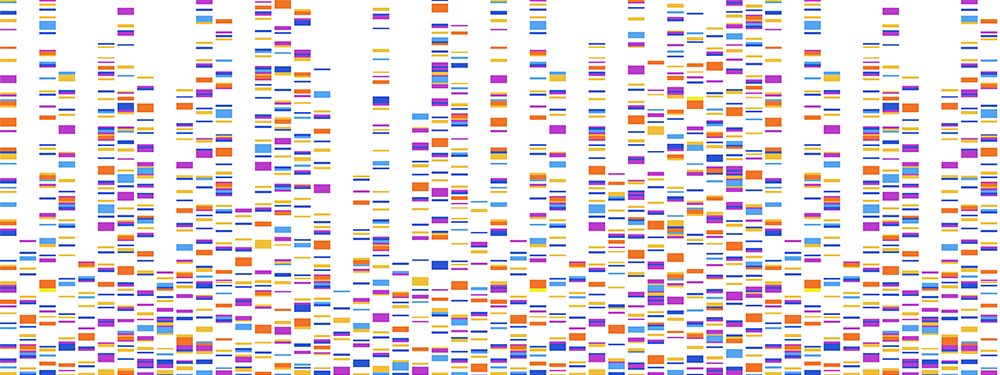Press Release: ComboMATCH investigators are translating robust pre-clinical evidence for new anti-cancer drug combinations into a series of early-phase clinical trials

Through a joint project and on common ground, a large number of investigators from US trial groups and the National Cancer Institute reached consensus on issues regarding the strength of pre-clinical data and study designs via extensive interactions
 "Through ComboMATCH, the NCTN groups and NCI are taking advantage of translational ideas, pre-clinical investigations, and early clinical experience from a large number of investigators working closely together," said James M. Ford, MD, of the Stanford University School of Medicine. Dr. Ford is a co-leader of ComboMATCH and is leading the coordination effort by the ECOG-ACRIN Cancer Research Group.
Each treatment trial will explore the evidence-based addition of a genomically-targeted agent to another anti-cancer therapy—whether that therapy is a single targeted agent or a standard chemotherapy agent or regimen. The hypothesis is that the combination will produce greater clinical activity than the standard treatment without the added targeted agent.
Some studies will measure the contribution of the additional targeted agent in a randomized cohort. Other studies will be single-arm designs, in cases where there are adequate data on the activity of the component agents individually to assess with confidence the activity of the combination.
Targeted therapy is a type of cancer treatment that targets proteins that control how cancer cells grow, divide, and spread. It is the foundation of precision medicine. As researchers learn more about the DNA changes and proteins that drive cancer, they are better able to design treatments that target these proteins.
Can pre-clinical data from in vivo models of drug combinations in the setting of known tumor genomic variants predict clinical activity in defined patient groups? ComboMATCH aims to find out.
"Through ComboMATCH, the NCTN groups and NCI are taking advantage of translational ideas, pre-clinical investigations, and early clinical experience from a large number of investigators working closely together," said James M. Ford, MD, of the Stanford University School of Medicine. Dr. Ford is a co-leader of ComboMATCH and is leading the coordination effort by the ECOG-ACRIN Cancer Research Group.
Each treatment trial will explore the evidence-based addition of a genomically-targeted agent to another anti-cancer therapy—whether that therapy is a single targeted agent or a standard chemotherapy agent or regimen. The hypothesis is that the combination will produce greater clinical activity than the standard treatment without the added targeted agent.
Some studies will measure the contribution of the additional targeted agent in a randomized cohort. Other studies will be single-arm designs, in cases where there are adequate data on the activity of the component agents individually to assess with confidence the activity of the combination.
Targeted therapy is a type of cancer treatment that targets proteins that control how cancer cells grow, divide, and spread. It is the foundation of precision medicine. As researchers learn more about the DNA changes and proteins that drive cancer, they are better able to design treatments that target these proteins.
Can pre-clinical data from in vivo models of drug combinations in the setting of known tumor genomic variants predict clinical activity in defined patient groups? ComboMATCH aims to find out.
 "The central hypothesis of ComboMATCH is that a precision medicine initiative organized around pre-clinical in vivo evidence will efficiently generate clinical studies that are likely to reach their clinical activity endpoints," said Funda Meric-Bernstam, MD, of The University of Texas MD Anderson Cancer Center. Dr. Meric-Bernstam is a co-leader of ComboMATCH.
This hypothesis sets ComboMATCH apart from other early-phase trials evaluating drug combinations, Drs. Meric-Bernstam and Ford explained in a recent publication.1 As a result, investigators expect ComboMATCH to become a primary vehicle for advancing the field of precision medicine in oncology.
"If successful, we expect the ComboMATCH model to become routinely implemented for early development of molecularly targeted oncology drug combinations in the future," said Dr. Ford. "This structure is also designed to identify beneficial therapies for patients with rare malignancies and/or rare molecular abnormalities in their tumors."
Three ComboMATCH treatment trials are already open for enrollment, with the network groups planning to open several more in the next few months. Overall, investigators expect to enroll about 2,000 patients, but that number could grow.
The combinations to be evaluated in ComboMATCH will include approved drugs and investigational agents that pharmaceutical companies contribute by collaborating under individual Cooperative Research and Development Agreements (CRADAs) with NCI.
Multiple researchers are leading each treatment trial, offering opportunities for both junior and senior investigators to collaborate with translational researchers.
"This is the era of team science and biomarker-directed therapy. The ComboMATCH collaboration is extensive and includes health care providers, clinical and translational researchers, statisticians, patient advocates, and industry partners. It is the great promise to improve patient outcomes that brings these stakeholders together," said Dr. Meric-Bernstam.
Precision medicine refers to the tailoring of treatment based on each person’s individual characteristics. In ComboMATCH, treatment focuses on specific molecular abnormalities known to drive cancer growth in cancerous tumors. The drug combinations show evidence that they may be more effective than single therapy in treating some cancers.
ComboMATCH is for patients with solid tumors that have spread to nearby tissue or lymph nodes (locally advanced) or have spread to other places in the body (advanced or metastatic) and have progressed on at least one line of standard systemic therapy. ComboMATCH is also for patients with a type of advanced cancer for which no standard treatment exists that has been shown to prolong overall survival.
Participants will be assigned to treatment based on laboratory tests that look at the unique genetic material (genes) of tumor cells. Patients with gene abnormalities included in ComboMATCH may benefit from the therapies being studied.
Each treatment trial has its own research goals, patient eligibility criteria, and enrollment timeline.
Statements by the NCTN Trial Groups
"The central hypothesis of ComboMATCH is that a precision medicine initiative organized around pre-clinical in vivo evidence will efficiently generate clinical studies that are likely to reach their clinical activity endpoints," said Funda Meric-Bernstam, MD, of The University of Texas MD Anderson Cancer Center. Dr. Meric-Bernstam is a co-leader of ComboMATCH.
This hypothesis sets ComboMATCH apart from other early-phase trials evaluating drug combinations, Drs. Meric-Bernstam and Ford explained in a recent publication.1 As a result, investigators expect ComboMATCH to become a primary vehicle for advancing the field of precision medicine in oncology.
"If successful, we expect the ComboMATCH model to become routinely implemented for early development of molecularly targeted oncology drug combinations in the future," said Dr. Ford. "This structure is also designed to identify beneficial therapies for patients with rare malignancies and/or rare molecular abnormalities in their tumors."
Three ComboMATCH treatment trials are already open for enrollment, with the network groups planning to open several more in the next few months. Overall, investigators expect to enroll about 2,000 patients, but that number could grow.
The combinations to be evaluated in ComboMATCH will include approved drugs and investigational agents that pharmaceutical companies contribute by collaborating under individual Cooperative Research and Development Agreements (CRADAs) with NCI.
Multiple researchers are leading each treatment trial, offering opportunities for both junior and senior investigators to collaborate with translational researchers.
"This is the era of team science and biomarker-directed therapy. The ComboMATCH collaboration is extensive and includes health care providers, clinical and translational researchers, statisticians, patient advocates, and industry partners. It is the great promise to improve patient outcomes that brings these stakeholders together," said Dr. Meric-Bernstam.
Precision medicine refers to the tailoring of treatment based on each person’s individual characteristics. In ComboMATCH, treatment focuses on specific molecular abnormalities known to drive cancer growth in cancerous tumors. The drug combinations show evidence that they may be more effective than single therapy in treating some cancers.
ComboMATCH is for patients with solid tumors that have spread to nearby tissue or lymph nodes (locally advanced) or have spread to other places in the body (advanced or metastatic) and have progressed on at least one line of standard systemic therapy. ComboMATCH is also for patients with a type of advanced cancer for which no standard treatment exists that has been shown to prolong overall survival.
Participants will be assigned to treatment based on laboratory tests that look at the unique genetic material (genes) of tumor cells. Patients with gene abnormalities included in ComboMATCH may benefit from the therapies being studied.
Each treatment trial has its own research goals, patient eligibility criteria, and enrollment timeline.
Statements by the NCTN Trial Groups
 “The Alliance for Clinical Trials in Oncology is pleased to participate in this exceptional research effort to advance precision oncology by NCI,” said Geoffrey Shapiro, MD, PhD, of Dana-Farber Cancer Institute, who is leading ComboMATCH efforts for the Alliance. “As part of the initial program, we are excited to activate three ComboMATCH treatment sub-studies. EAY191-A2 will evaluate a combination of the PARP inhibitor olaparib and the PI3K alpha isoform-selective inhibitor alpelisib in patients with BRCA-associated breast cancer. EAY191-A3 will test if co-inhibition of MEK and CDK4/6 by binimetinib and palbociclib, respectively, will provide a novel way to improve outcomes in ovarian, pancreatic, and other cancers with RAS mutations. EAY191-A6 will assess activity of the MEK inhibitor binimetinib in MAPK pathway-mutated biliary tract cancers in combination with chemotherapy in the second line. We are eager to initiate accrual for all the ComboMATCH trials and look forward to advancing these combinations for our patients.”
“The Alliance for Clinical Trials in Oncology is pleased to participate in this exceptional research effort to advance precision oncology by NCI,” said Geoffrey Shapiro, MD, PhD, of Dana-Farber Cancer Institute, who is leading ComboMATCH efforts for the Alliance. “As part of the initial program, we are excited to activate three ComboMATCH treatment sub-studies. EAY191-A2 will evaluate a combination of the PARP inhibitor olaparib and the PI3K alpha isoform-selective inhibitor alpelisib in patients with BRCA-associated breast cancer. EAY191-A3 will test if co-inhibition of MEK and CDK4/6 by binimetinib and palbociclib, respectively, will provide a novel way to improve outcomes in ovarian, pancreatic, and other cancers with RAS mutations. EAY191-A6 will assess activity of the MEK inhibitor binimetinib in MAPK pathway-mutated biliary tract cancers in combination with chemotherapy in the second line. We are eager to initiate accrual for all the ComboMATCH trials and look forward to advancing these combinations for our patients.”
 “The Children’s Oncology Group is excited about the activation of its ComboMATCH treatment trial, EAY191-C1, which will be open to patients with tumors harboring activating MAPK pathway mutations. Our prior experience with the NCI-COG Pediatric MATCH trial2 showed that MAPK pathway mutations are the most common targetable alterations in children with relapsed or refractory solid tumors,” said Douglas S. Hawkins, MD, group chair of the Children’s Oncology Group.
“The Children’s Oncology Group is excited about the activation of its ComboMATCH treatment trial, EAY191-C1, which will be open to patients with tumors harboring activating MAPK pathway mutations. Our prior experience with the NCI-COG Pediatric MATCH trial2 showed that MAPK pathway mutations are the most common targetable alterations in children with relapsed or refractory solid tumors,” said Douglas S. Hawkins, MD, group chair of the Children’s Oncology Group.
 "Through ComboMATCH, the NCTN groups and NCI are taking advantage of translational ideas, pre-clinical investigations, and early clinical experience from a large number of investigators working closely together," said James M. Ford, MD, co-leader of ComboMATCH and leader of the coordination effort by the ECOG-ACRIN Cancer Research Group.
"Through ComboMATCH, the NCTN groups and NCI are taking advantage of translational ideas, pre-clinical investigations, and early clinical experience from a large number of investigators working closely together," said James M. Ford, MD, co-leader of ComboMATCH and leader of the coordination effort by the ECOG-ACRIN Cancer Research Group.
 “NRG Oncology recently activated its first two ComboMATCH precision medicine initiative trials and we are engaged in accruing patients to this incredibly important effort. EAY191-N2 will be assessing two drugs for patients with hormone-receptor positive metastatic breast cancer with NF1 mutation and EAY191-N4 will be testing two drugs for recurrent or persistent ovarian and endometrial cancers with a RAS pathway mutation,” said Roisin O’Cearbhaill, MD, the NRG Oncology scientific representative. “We also are eager to open three more ComboMATCH trials later this year.”
“NRG Oncology recently activated its first two ComboMATCH precision medicine initiative trials and we are engaged in accruing patients to this incredibly important effort. EAY191-N2 will be assessing two drugs for patients with hormone-receptor positive metastatic breast cancer with NF1 mutation and EAY191-N4 will be testing two drugs for recurrent or persistent ovarian and endometrial cancers with a RAS pathway mutation,” said Roisin O’Cearbhaill, MD, the NRG Oncology scientific representative. “We also are eager to open three more ComboMATCH trials later this year.”
 “The SWOG Cancer Research Network has launched the first of its ComboMATCH treatment trials, EAY191-S3, to test whether adding targeted therapy with ipatasertib to standard chemotherapy improves outcomes for patients whose solid tumors have a mutation in an AKT gene. The study enrolls patients with advanced or metastatic non-breast tumors,” said Charles D. Blanke, MD, group chair of the SWOG Cancer Research Network. “SWOG also looks forward to testing other targeted therapy combinations within the NCI’s ComboMATCH platform in the coming months and years.”
“The SWOG Cancer Research Network has launched the first of its ComboMATCH treatment trials, EAY191-S3, to test whether adding targeted therapy with ipatasertib to standard chemotherapy improves outcomes for patients whose solid tumors have a mutation in an AKT gene. The study enrolls patients with advanced or metastatic non-breast tumors,” said Charles D. Blanke, MD, group chair of the SWOG Cancer Research Network. “SWOG also looks forward to testing other targeted therapy combinations within the NCI’s ComboMATCH platform in the coming months and years.”
About ECOG-ACRIN The ECOG-ACRIN Cancer Research Group (ECOG-ACRIN) is a membership-based scientific organization that designs and conducts cancer research involving adults who have or are at risk of developing cancer. The Group comprises nearly 1300 member institutions and 15,000 research professionals in the United States and around the world. Visit ecog-acrin.org, follow us on Twitter @eaonc, Facebook, and LinkedIn, or call 215.789.3631.
Citations 1. Meric-Bernstam F, Ford JM, O’Dwyer PJ, et al on behalf of the ComboMATCH study team. National Cancer Institute Combination Therapy Platform Trial with Molecular Analysis for Therapy Choice (ComboMATCH). Clin Cancer Res. 14 April 2023; 29 (8): 1412–1422. 2. Parsons DW, Janeway KA, Patton DR, et al. Actionable tumor alterations and treatment protocol enrollment of 1000 pediatric and young adult patients with refractory cancers in the NCI-COG Pediatric MATCH Trial. J Clin Oncol. 2022; 40:2224-2234.
###
View this press release on EurekAlert
Read the National Cancer Institute companion press release:
NCI’s ComboMATCH initiative will test new drug combinations guided by tumor biology
